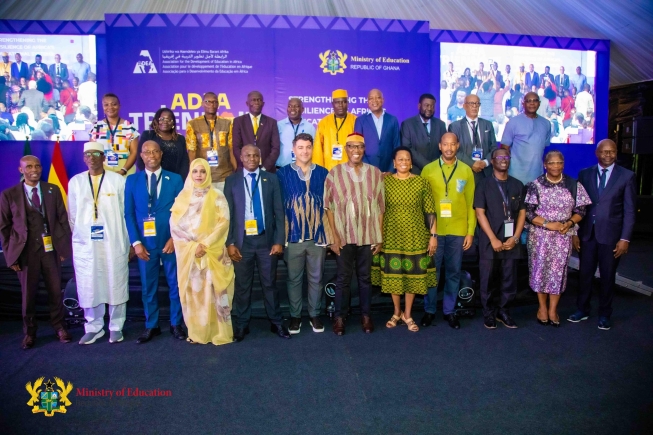
Translate discussions into tangible actions - Dr Apaak charges delegates at 2025 Triennale on Education
The Deputy Minister of Education, Dr Clement Abass Apaak, has urged participants at the just-ended African continental education event to translate the discussions into tangible actions at national, regional and continental levels.
“Let us carry forward the commitments made here. The resilience we seek begins with us as policymakers, educators, funders and citizens alike. Let the Accra Triennale be the catalyst for the transformation we desire,” he charged the participants.
Dr Apaak was addressing the closing session of the 2025 Triennale on Education and Training of the Association for the Development of Education in Africa (ADEA) at the Labadi Beach Hotel in Accra last Friday.
Continental
The continental event, on the theme: “Strengthening the resilience of Africa’s educational systems: Advancing towards ending learning poverty by 2035, with a well-educated and skilled workforce for the continent and beyond,” was attended by over 300 delegates from the continent, including high-level delegates and partners from the African Union, African Development Bank, Gates Foundation, Jacobs Foundation, Mastercard Foundation, UNICEF, UNESCO among others.
He commended the participants for devoting their time, energy and resources to converge, deliberate, innovate and commit to transforming education across Africa.
Dr Apaak stated that the event offered opportunities for participating countries to share successful, country-based interventions in areas such as data-driven reforms, government-led efficiency strategies, domestic fund mobilisation, school leadership and fostering multi-stakeholder collaboration.
“This programme has guided us through insightful plenaries, interactive side events and collaborative exhibitions, fostering a shared vision for resilient educational systems that can withstand challenges such as fiscal constraints, climate shocks and pandemics,” he said.
He was excited that the issues interrogated during the event aligned and resonated with Ghana’s national priority, citing areas such as foundational learning, educational technology, school leadership and education financing and stakeholder collaboration.
Call
Touching on a call by the Vice-President, Prof. Naana Jane Opoku-Agyemang, on Africa to rely more on its own resources to solve its problems, Dr Apaak said, while that might sound challenging, “I am convinced that with commitment, we can mobilise sufficient domestic resources to augment support from our development partners and funders significantly.”
Sharing with participants some success stories from Ghana, he said, initiatives such as the Ghana Education Trust Fund (GETFund) and the Student Loan Trust Fund provided crucial government-led support in the area of education financing.
Partners
“Furthermore, I am proud to share the success of our System Change Architecture for Learning Excellence (SCALE) initiative, which has seen a consortium of philanthropic and industry partners, including leading cocoa and chocolate companies, the Jacobs Foundation, Fondation Botnar and UBS Optimus Foundation, collectively raise a USD 40 million grant.
“This will expand differentiated learning approaches to more than 15,000 schools and two million Ghanaian children, enhancing our flagship Ghana Accountability for Learning Outcomes Project (GALOP). I encourage all other countries to explore similar local sources of funding,” he touted Ghana’s initiatives in the education sector.
Dr Apaak thanked ADEA for entrusting Ghana with the opportunity to host the event and also commended the government, the Ministry of Education and the local organising committee for the respective distinct roles played to ensure the successful hosting of the event.
He described the conference as highly successful, attributing it to the thematic areas, side events and the rich pool of knowledge and expertise presented.
“We leave here with a clearer path to 2035—one where every African child develops quality foundational skills and our workforce drives continental prosperity,” The deputy minister told the participants.
The Executive Secretary of ADEA, Albert Nsengiyumva, expressed gratitude to the government of Ghana and the Minister of Education for their warm hospitality and hosting the event and also thanked the high-level delegates for their keen participation and input.
He explained that the report presented at the end of the conference was a draft one and would be forwarded to all participating countries to make final input and fine-tune it for final compilation.
